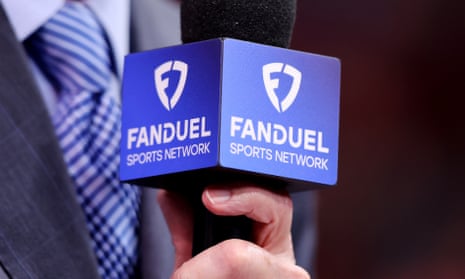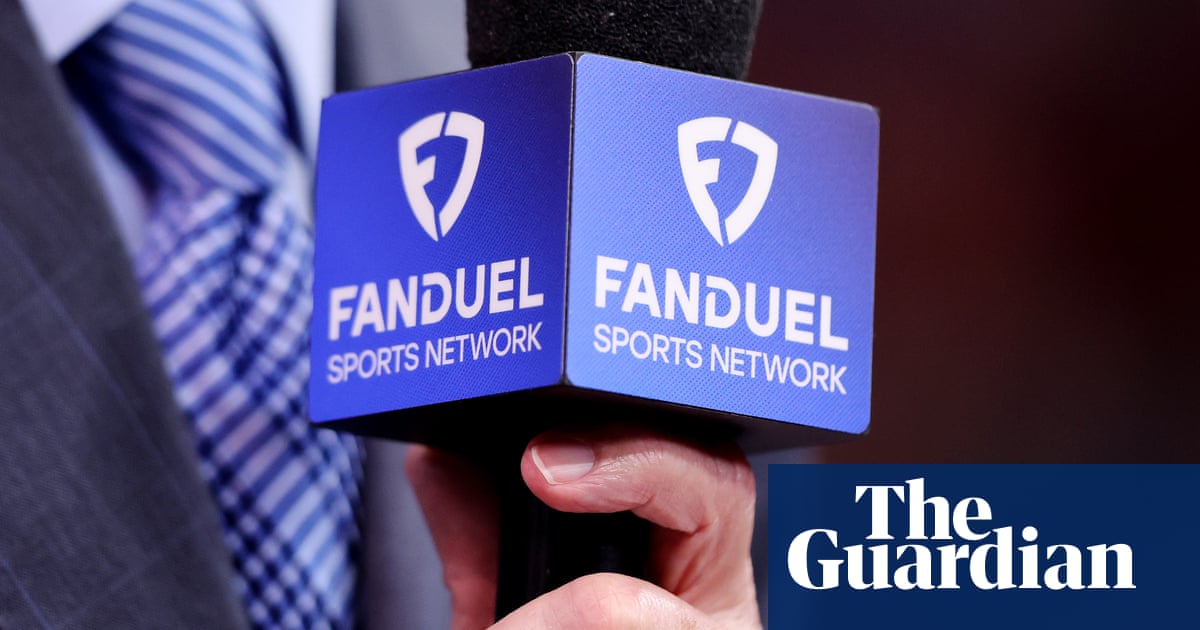
Fanduel network shows an industry bought and paid for by gambling
Amid the normalization of gambling, betting companies are resembling broadcasters and vice versa – and coverage is rapidly becoming a tangled web of vested interests
In sports broadcasting’s equivalent of a team changing its colors from red to blue in mid-season, the Diamond Sports Group, a bankrupt operator of 16 regional sports networks, last month rebranded its channels as the FanDuel Sports Network.
The prior name was already linked to gambling – Bally’s held the branding rights for three years. But FanDuel is a higher-profile new partner with a much larger parent company. Flutter, headquartered in New York and originating from the Irish-British merger of Paddy Power and Betfair, is the world’s largest online betting business.
If Bally’s is a brand that evokes Las Vegas-style gambling in a bricks-and-mortar casino, FanDuel looks more like the future: younger, fast-expanding, built for the smartphone era and blurring the lines between the media and the betting industry.
In 2022 it launched FanDuel TV, a channel that offers live action and original sports chat from veteran broadcasters and through a partnership with Bill Simmons’ The Ringer podcast network. Now FanDuel has its fingerprint on a broadcaster that holds regional rights to 13 NBA teams, eight NFL teams and a to-be-determined number of MLB clubs. It plans to syndicate FanDuel TV program on the FanDuel Sports Network.
Amid the normalization of gambling, betting companies are resembling broadcasters and vice versa. A convergence is taking place as gaming firms embed themselves in the sports media landscape while traditional media add gambling content, both responding to demand and perpetuating it.
As a result, coverage is rapidly becoming a tangled web of vested interests. It is increasingly challenging for fans to find a mainstream provider without a stake in the gambling industry, whether they are consuming content directly produced or sponsored by a gaming business, made by a traditional media company with a wagering side hustle, or officially linked to leagues and teams. The major American leagues and many teams have gaming partners.
The Diamond and FanDuel partnership “is a more direct connection to mobile sports betting, an evolution” of the Bally’s arrangement, says Patrick Crakes, a media consultant and former Fox Sports executive. “It’s taking advantage of the folks who are there and adding another level of engagement that can be monetized. For some folks it will be the primary reason why they’re engaging… the only reason why they’re watching a game is because they’re gaming.”
Regional sports networks (RSNs) attract loyal fans who watch their teams religiously. That makes them enticing targets, according to Crakes: “The gaming companies need daily bettors. I’ve always thought that pairing up with the RSNs on the gaming side is a good place to do it. Because a lot of the folks you want to reach if you’re a sports gaming company are probably watching those games.”
The Diamond deal is the latest salvo in a battle between FanDuel and its main rival, DraftKings, for the biggest share of the fast-growing US legal sports betting market, with sports wagering now allowed in 38 states after a 2018 US supreme court ruling permitted states to make their own laws.
The digital DraftKings Network offers TV and movie reviews as well as sports news, betting advice and a programming schedule anchored by the star podcaster Dan Le Batard, formerly of ESPN. In 2021 DraftKings reportedly beat out interest from the radio network SiriusXM by agreeing to pay Le Batard’s media company at least $50m over three years in a distribution, monetization and sponsorship deal. It also sponsors podcasts on a network founded by another popular personality, Colin Cowherd.
While traditional media companies struggle to retain audiences and stay profitable in the cord-cutting and online news era, DraftKings and FanDuel are growing revenue fast and have the marketing budgets to spend heavily on ventures that complement their advertising blitzes. (DraftKings is loss-making but expects to turn a profit soon.)
“To our fans, know that DraftKings is the reason you aren’t behind a paywall, and I’m promising you the money won’t change the show or corrupt us in any way,” Le Batard said in a statement in 2021 that anticipated an obvious concern: bias.
Shilling for an insurance company or supermarket chain is unlikely to have life-altering consequences for listeners or pose ethics questions for outlets. As online sports betting surges, however, problem gambling hotlines are detecting increases in the volume and seriousness of calls, with support services and regulation struggling to keep pace with a boom that puts young people at particular risk.
While responsible gambling advice routinely accompanies programming, it’s typically perfunctory. And pervasive sponsorship and industry-generated content mean fewer sources without potential conflicts of interest. “Betting-related controversies have swept through sports,” noted an ESPN website story examining the risks to leagues and players in March. Mentioned in passing in the middle of the article was the fact that ESPN signed a deal with a gaming operator last year to create a sportsbook named ESPN BET.
Reporting on players embroiled in scandals is unavoidable: outlets could hardly ignore a Toronto Raptors player being banned from the NBA for life. But addiction is a public health issue and examining the role of the sports and media industries in a disorder that affects about 1% of ordinary, non-famous and less obviously news-worthy Americans, requires more pro-active and harder editorial choices.
“Sport media companies in general may previously been playing a watchdog role in terms of the negative effects that gambling could have on sport, gambling addiction or players shaving points,” says Stephen Shapiro, a professor in the Department of Sport and Entertainment Management at the University of South Carolina. “Some of the traditional ways of covering gambling are going to change when companies like ESPN are in the business of gaming. Over time, does it erode some of the journalistic credibility that media might have in covering sport?”
ESPN Bet is a minor player and ESPN insists that journalistic integrity is crucial to its brand. Still, breaking news, such as player injuries and coaching hires, has the potential to influence betting markets.
In 2021 the Athletic and BetMGM announced an “exclusive partnership” and promised to “seamlessly blend media, analysis and betting”. Last year, the NBA “insider” Shams Charania, then a reporter with the Athletic, now at ESPN, sent a tweet about the draft that moved the odds on FanDuel – who happened to be paying him to appear on FanDuel TV. Like ESPN, The Athletic has ethics rules on gambling by its journalists that are designed to avoid actual or perceived conflicts of interest.
The Associated Press, a wire service that touts its independence, signed a deal in 2021 to make FanDuel its exclusive provider of sports odds. In 2021 the AP gave staffers who worked on the FanDuel deal an internal achievement award for “[turning] sports odds into an exciting revenue opportunity” that “is the type of business growth that is essential to AP’s future”. This year the AP switched its odds provider to BetMGM and even publishes columns provided by BetMGM, with one recently appearing online in the Washington Post.
Media companies “know the revenue opportunities and so they’re willing to take a calculated risk that the consumer isn’t going to be bothered so much by the potential clash between promoting sport gambling and providing media coverage for those same sports,” Shapiro says. “Certainly I think the credibility of a media organization can be questioned when they’re in these partnerships and also reporting on issues related to sport gambling.”
For broadcast networks, gambling tie-ins add a revenue stream that works in synergy with live and pre-game betting. “Sport gambling is a complementary activity to the core product so it’s ideal for second-screen usage,” Shapiro says. “What we’ve seen in our research is that an individual still is a traditional fan of a team, but they’re clearly consuming at a higher level: consuming more games, consuming games for a longer period of time the more that they’re involved in gambling.”
More research needs to be done, Shapiro adds. “Are sport fans who gamble more interested in watching pieces of games instead of games in their entirety? Are they more interested in the beginning of a game or the end of a game? Are they more interested in players than actual teams? I think that’s the next stage in studying the impact of gambling on sport.”
It’s not hard to imagine algorithm-driven future scenarios. Perhaps you’re watching your baseball team on television and they’re down by four runs heading into the ninth inning. You’re about to switch off – but then a tempting in-game wager promotion flashes up on the screen. You grab your phone or remote control, make the bet and keep watching: a win for the broadcaster, the gambling company and the league, regardless of the final score.
